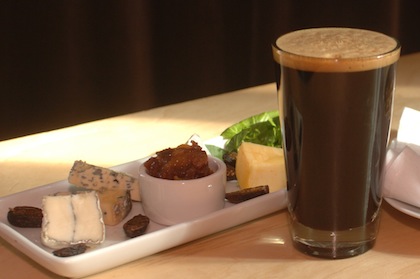In a distant bowling alley, I remember bowling with my grandfather while he enjoyed his beer of choice, a beer some might now call a “macro lager.” So what has become of the lagers of my grandfather’s generation? Water, malt, rice, corn and hops defined lagers for most 20th century American beer drinkers and today we’re still bombarded by ubiquitous advertisements for what is now known as American style lager: low hops, low malt, easy to drink, and inexpensive. But let’s face it, the tastes of beer consumers are changing and so are the tastes of the lagers they drink, thanks to a new generation of American craft brewers and beer connoisseurs.
Many American craft brewers are now taking lessons learned from the production of flavorful ales and tackling the challenge of brewing lagers that appeal more to the palate than to production costs. With a nod to their European brethren, American brewers are making lagers that are competitive, flavorwise, with European counterparts on the world stage and not only within categories that begin with the term “American.” While some domestic brewers are vying for notoriety within the strict confines of the Reinheitsgebot, others are making attempts at en vogue pre-Prohibition American lager styles. Yet others are following their own muse.

(Kinsley Dey)
While focusing on this changing American market, let us not forget the lasting legacies many European breweries have spent long decades, even centuries building. Germany’s Privatbrauereien Aying, Hofmül, Bischoff and Hofbräu München offered truly great examples of traditional German lager styles in this year’s World Beer Championships. No one could considered these lagers boring or uninspired.
Pilsners are of the most duplicated and oft-modified styles and Germany’s Privatbrauerei Bischoff Premium Pilsner (91 points) was a remarkable textbook example. We were also pleasantly surprised by newcomer Alaska’s Silver Gulch Brewing & Bottling Co.’s seamless Coldfoot Pilsner (92 points); and The Boston Beer’s take on the classic Bohemian pilsner with Samuel Adams’ Noble Pils (90 points), which is brewed with a blend of five hop varieties from the world’s only remaining noble hop growing regions.
With origins in Bavaria, a seasonal offering, Märzenbier, or March beer, was originally brewed in March, and then lagered until late summer with bottles always saved for raucous Oktoberfest celebrations. Oktoberfest selections have become very fashionable in recent years and demand for these copper-colored, fuller-bodied thirst quenchers has increased dramatically, with seemingly every producer clamoring to offer this seasonal brew. Classic German examples of Oktoberfest-style beers in this year’s tasting included: Hofbräuhaus Müchen’s Hofbräu Oktoberfest (93 points), Privatbrauerei Hofmül’s Volksfestbier (93 points), and Privatbrauerei Aying’s Ayinger Oktober Fest-Märzen (91 points). Brooklyn Brewery’s Oktoberfest (92 points), Stegmaier Oktoberfest (90 points), and Narragansett’s Fest Beer (89 points) rounded out top domestic Oktoberfest bottles. We also saw several excellent brewpub drafts, including Deschutes’ delicious Oktoberfest Lager (92 points), Oktoberfest Lager from John Harvard’s Brew House in Framingham, MA (90 points); and Michigan’s Bastone Brewery’s Rocktoberfest Lager (89 points, eponymously named after Bastone’s own brewmaster Rockne VanMeter).
Once considered experimental, barrel-aging is becoming a more common practice many brewers use to add a special flourish to an already stellar product. Browning’s Brewery’s Bourbon Baltic Porter from Kentucky (93 points) does not disappoint with an almost “sessionable” barrel-aged Baltic porter, if there is such a thing (and apparently now there is), that would pair wonderfully with a thick slice of Roquefort.
Today’s lagers are no longer my grandfather’s lagers. His are still around, but they have a lot of company. So, on that optimistic note, pour a pint of any one of these bottom-fermented brews that may very well may define the next generation of beer drinkers. Perhaps it will not just be the memory of an advertising campaign that will linger, but the lager as well.










